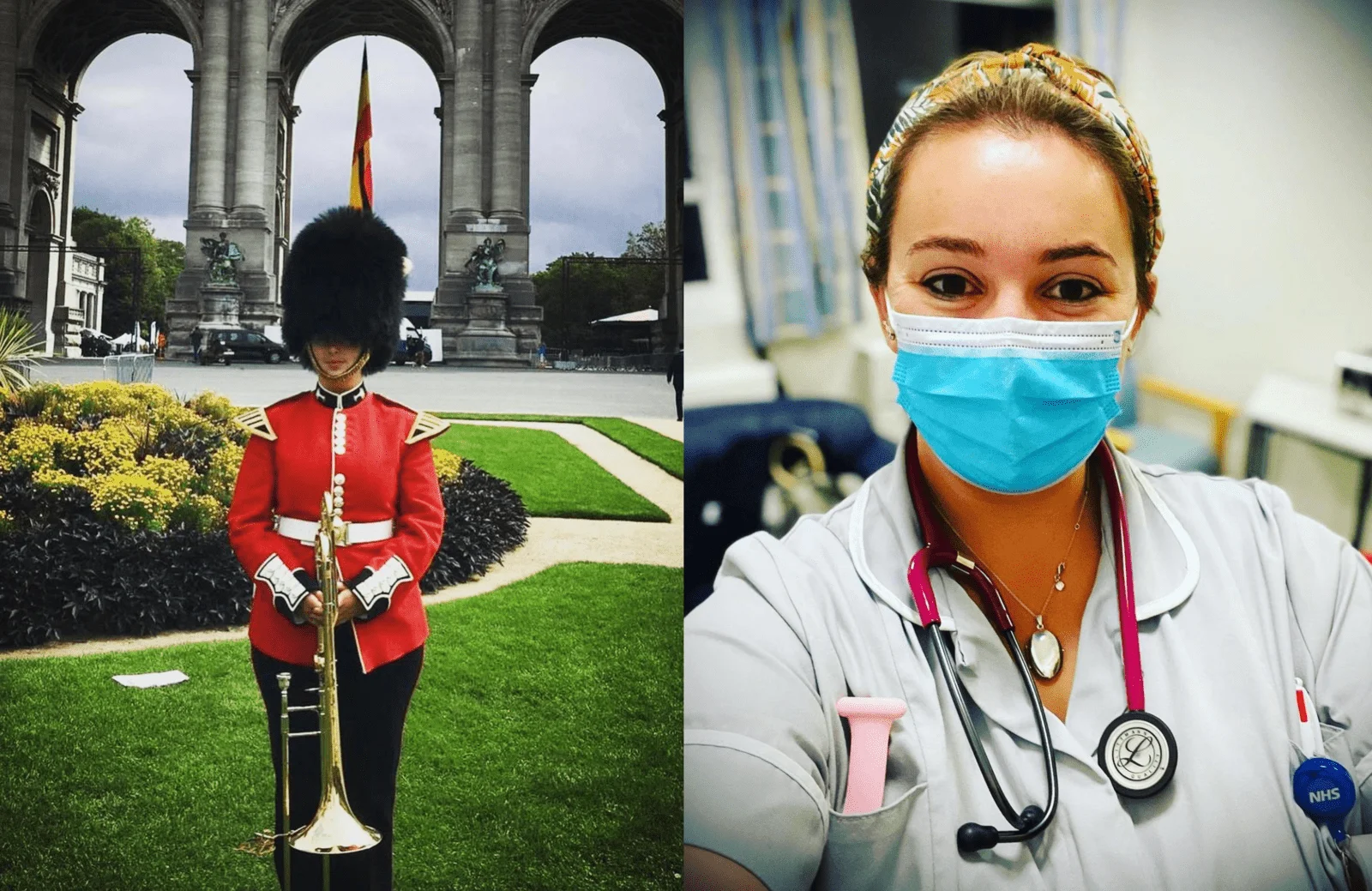Student midwife Emily’s story
My name is Emily. I’m a second-year student midwife, and I absolutely LOVE it.
Before starting this amazing journey in midwifery, I was a Musician in The British Army for nearly nine years. I was a member of The Band and Bugles of the Rifles and then The Band of The Welsh Guards, playing in many prestigious events all over the world. However, even on these magnificent stages, performing at incredible events for many famous faces – including celebrities and royalty, I still felt there was something missing.
After much reflection and discussion with my nearest and dearest, I decided to take a huge leap of faith, and apply for my Midwifery degree.
I felt I had more to give the world. I wanted to make a difference and help people – and what better way to give back and help people than being a midwife?
To my absolute astonishment, I was accepted for an interview. I prepped hard with cue cards and practicing interview scenarios with everyone who would sit and listen to me. A few weeks later I was delighted to find out I was accepted, and my wonderful midwifery journey was about to properly begin! My excitement level was at level 10/10!
Before I knew it, it was the night before my first day at university – my bag packed with my fresh, shiny new pencil case, note pads, water bottle and sandwich tin – and it was GO time!
As COVID-19 restrictions were still in place when I started, lectures took place online for a while, which I enjoyed because it meant we were able to look back at the lectures recorded if we needed anything repeating. Saying that, it was really nice to finally meet my fellow students when we were allowed back into the building.
A typical day as a student midwife on Labour Ward (LW) is jam-packed with lots of information, lots of documenting, lots of chatting with your appointed woman and her birthing partner, lots of running around to ensure you are one step-ahead of situations – and of course, lots of coffee and sweets!
As a student, you have a qualified midwife mentor, who will teach you everything you need to know, and oversee your practical clinical skills, with the aim of signing you off as ‘proficient’ at the end of your placement block. Some of the common clinical skills you will practice on placement are manual observations, like pulse and blood pressure, blood sugars, injections, taking bloods and working out drug calculations. There are also the observations you will need to do for the baby (once born), including weighing, administering the Vitamin K injection (should this be the parents’ wish), and breastfeeding support if needed.
Something I wasn’t aware of until working on LW was the immense number of tasks that need to be completed post-delivery. As well as the baby checks and Vitamin K injection, the placenta needs to be checked (to ensure it is complete and intact with three vessels and two membranes and assessing its colour and texture). If the baby was delivered vaginally, any tearing or excessive bleeding must be assessed. The room needs to be cleaned and tidied up, And, of course, the all-important tea and toast needs to be made for the new parents. After this is all completed, we will finally leave the new family in peace and privacy – while we go and complete all the documentation on the computer.
I will never forget my first delivery as a student midwife. I will never be able to thank the lovely couple under my care enough for trusting me to support and guide them to the safe delivery of their first (beautiful) little baby. It was an honour and privilege to be a part of their momentous day. And I’m not ashamed to say, when I lifted the baby around to place him on his mum’s chest, announcing to the room “Congratulations, you have a beautiful little boy”, I shed a few tears of joy and pure astonishment.
Irrelevant of delivery type, every single birth is amazing. And that is my motivation to do my very best every single shift, to qualify and be the best possible midwife I can be – to ensure every woman has the best birthing experience possible; that is right for them and their wishes.
One of the most important things I have learnt during my first year of training is to listen: listen to the woman under your care; listen to birth partners; listen to the babies (whether that be in utero on the CTG or when they cry at birth); listen to your fellow students, colleagues, mentors, and lecturers – and last, but definitely not least, listen to yourself.
Describing how rewarding midwifery is in words is way beyond my vocabulary. But midwifery is incredibly challenging at times. Resilience and personal wellbeing are extremely important – as the flight attendants say, you must apply your own mask to ensure your own safety before you are able to assist anyone else.
I feel incredibly lucky every day to have found my calling, and to be allowed to be present at the most special and personal moments of a family’s life. I have to pinch myself to remind myself this is actually real, and what a privilege is it to bring the next generation into the world!
Do you work with pregnant women and birthing people?
Our training equips doctors, midwives and other birth workers with knowledge of the law and human rights principles, an understanding of how to apply it in practice, and the ability to communicate effectively with women and birthing people in a way that upholds their human rights. We offer a 10% discount to multidisciplinary teams.
Need advice about your maternity care?
Knowing your rights and the law in pregnancy and childbirth is important. If you have are pregnant or recently given birth and need advice on any aspect of your care, please contact our advice team.
Our free factsheets provide you with the latest information on your rights, where they come from in law, and how they are backed up in guidance.

